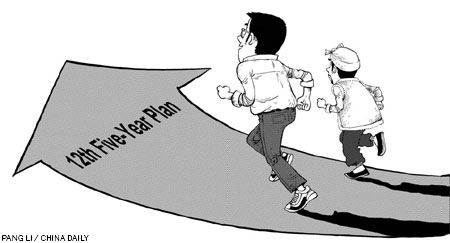Op-Ed Contributors
Toward healthy development
By Qin Xiaoying (China Daily)
Updated: 2010-11-20 07:48
 |
Large Medium Small |

If implemented properly, 12th Five-Year Plan will help transform the country into a more prosperous society
The 12th Five-Year Plan (2011-2015) will take effect from next year, a year that will also mark the 90th anniversary of the founding of the Communist Party of China (CPC).
The Fifth Plenary Session of the 17th CPC Central Committee, held last month, highlighted the importance of the macroeconomic plan for the next five years. The guideline for the plan presented by CPC General Secretary Hu Jintao is crucial for the country's development in the next five years and the building of a moderately prosperous (xiaokang) society, put forward by the Party.
"After 40 to 50 years, that is, by the beginning of the new century, China will have undergone great changes and become a powerful socialist industrial nation, making larger contributions to humankind," former Chairman Mao Zedong predicted as early as the mid-1950s on the completion of the First Five-Year Plan (1953-1957).
In 2008, Hu Jintao vowed to develop China into a higher-level xiaokang society by the time the CPC celebrated its 100th anniversary. A higher-level xiaokang society means a society in which every person benefits from economic development. With just 10 years, or two five-year plans, left to achieve that goal and the last relay baton in its hands, the CPC has reasons to feel a sense of urgency.
The Fifth Plenary Session of the 17th CPC Central Committee adopted a non-elusive attitude toward a variety of problems and contradictions seen in the country's economic and social transformation process. Despite the rapid economic development of the past three decades, the country still faces a series of problems: the contradictions between fast growth and an imbalanced economic structure, between increasing social wealth and widening income disparity, and between the rising diversity of its industrial products and their declining international competitiveness.
China has improved the livelihood of hundreds of millions of its citizens and accelerated the urbanization process, but it is still struggling to improve its laggard public services and change its unreasonable urban and rural hukou (house registration) structure. It has made great progress in conserving energy and reducing greenhouse gas emissions but is still under pressure to improve its fragile ecosystem. It has strengthened its market economy status but is yet to remove economic bottlenecks and eradicate corruption.
Moreover, despite China's ever-increasing contributions to the world economy, it still has limited influence on global economic and trade relations. And lastly, its value-added products have not kept pace with its accelerating industrial upgrade.
But the fifth plenary session has shown that the CPC is now more determined to solve all these problems, reform the country's economic and political systems and transform the economic development model followed during the past three decades.
At the plenary session, the CPC played down the importance of GDP growth and attached more importance to the essence of the country's economic and social development. In other words, it has vowed to follow a people-oriented development policy by working harder to improve people's livelihood and promote social equality and fairness.
The CPC's top priority now is to take measures to improve people's livelihood, expedite economic and social transformation and implement various kinds of reform.
The CPC has vowed to increase the share of people's income in the national revenue and raise the proportion of workers' income in the primary distribution system. Achieving these goals is vital to developing a harmonious employer-employee relationship and changing the country's unreasonable income distribution pattern. Lest one misunderstands, the moves are aimed not only at pacifying dissatisfied elements and stabilizing society, but also at putting the country on the track of healthy development through a consumption-driven economy.
In pushing for a coordinated and balanced development of the national economy, the CPC shows its increased emphasis on creativeness and innovation. The CPC has thus vowed to adopt an economic growth model that will ensure even development in the country's eastern, central and western regions and rejuvenate the old industrial bases in the northeastern region. It has thus drawn a more explicit road map to strike an economic balance in the development of all its regions.
It is clear that the CPC is striving to develop an economy in which its different regions are mutually complementary, land resources are used efficiently and citizens enjoy a harmonious relationship with nature. These policies, if implemented properly, will undoubtedly benefit the developed eastern regions and the less-developed western regions both.
China's development offers the world opportunities instead of threats. This has been more than amply proved in the past two years since the global financial crisis broke out. And Premier Wen Jiabao's remarks that the world will benefit more from a more prosperous China will resonate louder during the implementation of the 12th Five-Year Plan.
The author is a research scholar with the China Foundation for International and Strategic Studies.
(China Daily 11/20/2010 page5)